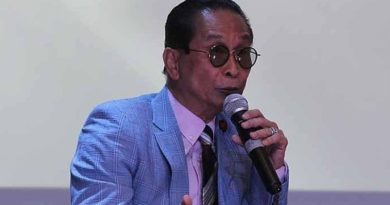COLUMN-OPINION: NEWSTAND ‘Is the Philippines a lost cause?’ By: John Nery
The defeatism of the Duterte administration in almost all matters relating to the Middle Kingdom is pronounced and, ultimately, unpatriotic. It shortchanges the country’s best interests, and mocks the independence proclaimed 120 years ago today. It betrays the Philippine legacy of heroism which, for a few years at the turn of the 20th century, helped inspire Chinese nationalism.
It may be that administration officials are unaware of this history, but it is certainly the case that they are unworthy of it. They treat Beijing as an unstoppable power, the bully in the region’s schoolyard, and their China policy can be described, fairly, as the smaller bully’s characteristic treatment of the bigger bully: appeasement. Even their response to criticism of their China policy—that critics want to wage war—promotes Beijing’s view, not Manila’s.
.
ADS by Cloud 9:
.
– SPACE RESERVE FOR YOUR ADVERTISEMENT –
.
.
The late Roilo Golez was right to emphasize in his muscular Twitter advocacy that no Filipino wants to go to war against China; there are, however, many options short of war that the Philippines must avail itself of to defend its territory, its rights, its very reputation. I have described President Duterte’s statements and decisions as “something only the defeatist, defeated leader of a colony would say” or do. They suggest that the real administration policy is surrender: The Philippines is a lost cause.
ADS by Cloud 9:
.
– SPACE RESERVE FOR YOUR ADVERTISEMENT –
.
.
What a fall from grace, for the first country in Asia to revolt against its colonial masters—and for one of the early sources of modern Chinese nationalism.
“[In] the Philippine revolution was found the first proximate example [for China] of how a ‘stateless’ people could turn their weakness and ‘statelessness’ to strength and purposeful activity,” the scholar Rebecca Karl writes. “This was one of the major points of the first full-length Chinese essay on the Philippines, entitled ‘On the Independence of the Philippine islands,’ written by Ou Jujia in 1899.” Ou had “set the vitality of the emerging Philippine events against what he saw as the demoralized and defeated Chinese political and intellectual milieu.”
I do not mean to say that Xi Jinping’s nationalism-on-steroids is the direct consequence of what early 20th-century Chinese nationalists learned from the Philippine revolution; nationalism in the current Chinese context is the substitute ideology that now forms the core of the Chinese Communist Party’s thinking. This is part of the reason for Beijing’s increasingly aggressive claims to almost all of the South China Sea; the fate of the Party itself is at stake.
What I do mean to suggest is that the Philippines, small as it is, had something to teach the ancient civilization of China — and may have something to teach it again. But Beijing, or any other country, will not give us a hearing if we carry ourselves without any self-respect.
In her “Staging the World: Chinese Nationalism at the Turn of the Twentieth Century,” Karl writes of the time, roughly between 1897 and 1903, when the Philippines held China’s attention: “It is a rare turn-of-the-century political essay or editorial
ADS by Cloud 9:
.
– SPACE RESERVE FOR YOUR ADVERTISEMENT –
.
.
that does not include mention of both the Philippines and the Transvaal (Boers) as inspirational examples from which China could learn… both situations had both so seeped into the consciousness of Chinese intellectuals by late 1899 that the invocation of these two examples in the writings of the period are almost incantatory in their frequency.”But it was when the Americans betrayed the Filipino revolutionaries under Emilio Aguinaldo (no, not Agoncillo) that Chinese political and intellectual classes, laboring under a century of humiliation at the hands of foreign powers, began to see the Philippines in a new light.
Karl writes: “This significance was underscored by the personal relationships forged in Japan and Hong Kong between leaders of the Philippine revolution and Chinese intellectuals in exile. Thus, at the same time as awareness grew of the potential for revolution to solve China’s problems, awareness also grew of the Philippines, dominated by a foreign power yet actively forging a new path in history.”
It was not only China that saw revolutionary Philippines as a source of patriotic inspiration. As I wrote in “Revolutionary Spirit: Jose Rizal in Southeast Asia,” Indonesians saw “Filipina di bawah Jose Rizal” (the Philippines under Jose Rizal) as one of the primary external factors that led to the formation of the Indonesian nation. Would that our government officials and our diplomats act as worthy legatees, not dissolute heirs, of a proud, independent heritage.
ADS by Cloud 9:
.
– SPACE RESERVE FOR YOUR ADVERTISEMENT –
.
.
On Twitter: @jnery_newsstand / Philippine Daily Inquirer / 05:11 AM June 12, 2018
ADS by Cloud 9:
.
– SPACE RESERVE FOR YOUR ADVERTISEMENT –
.
.
 All photographs, news, editorials, opinions, information, data, others have been taken from the Internet ..aseanews.net | [email protected] |.For comments, Email to :D’Equalizer | [email protected] | Contributor
All photographs, news, editorials, opinions, information, data, others have been taken from the Internet ..aseanews.net | [email protected] |.For comments, Email to :D’Equalizer | [email protected] | Contributor










